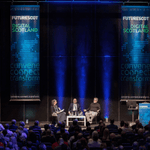Harvey Nash proudly represented the intersection of talent, technology, and sustainability at Web Summit Lisbon 2025. Nash Squared’s Group Technology Evangelist, David Savage, hosted two pivotal sessions on 11th November, bringing critical discussions on the environmental footprint of AI and the essential perspectives of young innovators to the forefront.
David Savage, who is also a filmmaker, podcaster, and host of Tech Talks, delivered a keynote on the crisis of computational power and moderated a vital panel that explored how established organisations can better engage with and support the next generation of tech leaders.
Hidden data, visible cost
David Savage’s keynote, titled “Hidden data, visible cost: The alternative approach to tackling technology’s green blind spot”, was held on Stage 7 as part of the New Energy Summit, where he showcased the latest Tech Flix film, 'Data's Untold Story'.
The crisis of power and scalability
The keynote focused on the urgent challenge that AI’s accelerating opportunity is colliding head-on with a physical force: power. David emphasised that every prompt typed, every token generated, and every model trained consumes real, finite power. This is not merely a climate discussion but fundamentally a scalability issue. If the power problem remains unsolved, the significant opportunities AI presents across healthcare, education, and society will not be realised.
Key data points highlighted the severity of the infrastructure stress:
- The global data sphere is projected to hit 175 zettabytes by 2025.
- AI data centres demand vastly more power, requiring 150+ kilowatts per rack, compared with traditional cloud data centres, which typically need only 10–20 kW per rack.
- To meet the peak load of just 90 new AI data centres being built in Ohio, the estimated power requirements equate to that of 21 million households.
The digital landfill and unseen emissions
David argued that the problem is invisible, making it difficult for people to grasp the full scale of the impact. A central focus was the “digital landfill”: a staggering 68% of the data currently stored is single-use, never utilised again.
This unused data poses a major environmental risk, with the emissions it creates typically exceeding those produced by the entire airline industry combined. Despite this reality, research suggests an abdication of responsibility across the industry. Our Nash Squared/Harvey Nash Digital Leadership Report found that only 44% of boards support net zero targets to a great or extreme extent, leaving half of leadership still disengaged. David noted that this overwhelming challenge persists because, unlike a smoking car or plane, the data is invisible, and we “forget that it burns”.
The call for engineering and accountability
To move forward sustainably, David urged the audience to pivot the discussion away from just ethics and ideology, stressing the need to focus on engineering and business goals. The industry must shift its focus from maximising performance to prioritising the minimisation of resource consumption through innovation.
Examples of meaningful action were presented, such as a project that detected and deleted 600 billion commercial and promotional emails in a year, which in turn reduced carbon emissions by 6,500 tonnes of CO₂. The concluding message stressed that the industry must implement energy efficiency in designs, demand accountability across policies, and embrace collaborative solutions. Only through these actions can the progress of AI be ensured as sustainable, inclusive, and scalable for everyone.
Young minds, big impact
Later that afternoon, David Savage moderated the “Young minds, big impact” panel on Stage 8 as part of the People Summit.
Introducing the next generation of innovators
The session offered deep insights into how young people are approaching major global problems through technology, featuring three exceptional innovators:
- Heman Bekele, Founder & Researcher, Skin Cancer Treating Soap: Developed an affordable bar of soap intended to treat the early stages of skin cancer. He also founded Care for All, a non-profit focused on providing platforms for young people to make an impact.
- Raya Mardani, Founder, Lunniva: Creating a period pain belt using Brain–Computer Interface (BCI) technologies to send electrical signals to the brain to release endorphins, aiming to alleviate pain.
- Aarav Sharma, Founder & Researcher, Smart Bin AI & Brain–Computer Interfaces: Focused on restoring independence for paralysed individuals by using BCI to control an exoskeleton arm through thought.
Redefining youth engagement and education
A major theme discussed was how established corporations engage with the next generation. The panellists felt that many companies often focus on “selling to” young people rather than treating them as active participants. Instead, companies should aim to integrate youth, providing them with a seat at the table and enabling the actual implementation of their ideas.
Regarding education, Raya highlighted that programmes like TKS (The Knowledge Society) are vital because they offer long-term, committed project work, which is often missing from traditional education. Aarav proposed decreasing traditional school hours and allocating that time for students to build projects and explore their passions, arguing that the future of work requires complex, applied skills that AI cannot yet master.
Mentorship and the power of indifference
The panel addressed the frustration that arises when their ambitious projects are dismissed as mere “school projects” by older professionals. The consensus was that maturity is far more dependent on the individual than their age.
The panellists stressed that successful engagement requires mentorship. They also emphasised that for allies to be effective, they must be indifferent to age.
David noted that this generation should be treated like any other professional pitching an idea, with critical feedback and advice, but without letting age shield the interaction. The message was clear that young people are the future, and investing in them is paramount for any company looking to be innovative and competitive.
About David Savage, Group Technology Evangelist
David Savage is Nash Squared’s Group Technology Evangelist. He creates podcasts, hosts video debates, and regularly chairs keynote stages at major events. A passionate advocate for technology, he explores both its challenges and opportunities.
Since 2015, David has been the editor and host of Tech Talks, a leading global podcast on technology and leadership.
He has spoken at top international events, including Web Summit, Collision, IFA Berlin, Web Summit Rio, Unleash World, Unleash Paris, Unbound, Big Data World, and VivaTech.
Watch both sessions below to explore these discussions in full. From tackling AI’s hidden environmental cost to empowering the next generation of innovators.



